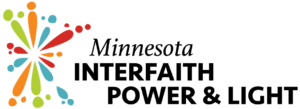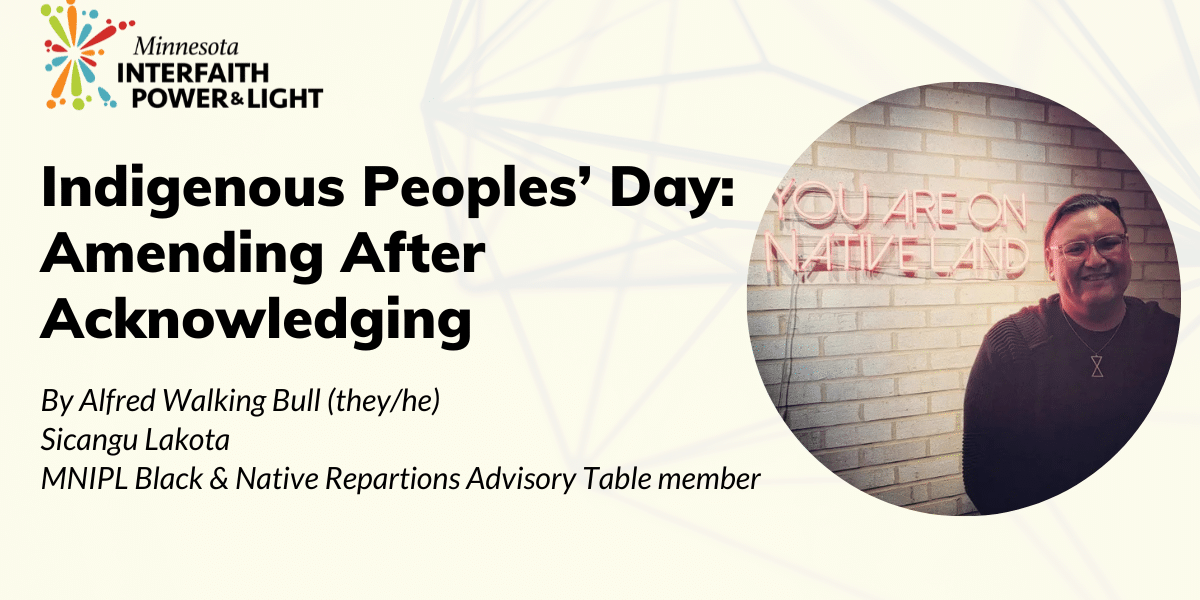Indigenous Peoples’ Day: Amending after Acknowledging
By Alfred Walking Bull (they/he)
Sicangu Lakota
MNIPL Black & Native Reparations Advisory Table member
Alfred is a member of the Black and Native Reparations Advisory Table and is an Indigenous Catholic/Walakota Practitioner. We asked them to share their perspective on Indigenous Peoples’ Day about how faith, spiritual, or religious communities and all Minnesotans can move from acknowledgment to action.
If you’ve seen the meme, bear with me as I set the scene. The post is from Russ Aegard on Facebook. It goes something like this:
“After a ‘land acknowledgment’ at our school this year, I took one of my students’ water bottles and walked to the front of the class.
“I then acknowledged that it was their water bottle and in the spirit of reconciliation, I felt it important to acknowledge that it was theirs as that would help heal ‘all of us’ for my behaviour. I then placed it on my desk.
“They looked at me and I asked them what was wrong. They told me they wanted their water bottle back.
“Apparently the words of acknowledgment without the action of reconciliation (returning of stolen property for example) didn’t work for them.”
The moral of this story is that Land Acknowledgements are just the beginning of a journey. For people of faith, conscience, or religion—particularly Christians in the United States and its colonies—acknowledging wrongdoing has become the same thing as being forgiven. They can’t help it, as human beings we often tell ourselves comforting untruths to make the reality feel better.
“We are a nation of immigrants.”
Indigenous people were here first. Spanish and English Christians used the cannon, gun and Bible to justify their presence and exploitation of Turtle Island. Enslaved African people did not immigrate here, they were stolen as well. And currently, immigration is a double-standard for people who cross at the southern border.
“We are a nation of second chances.”
Redemption and forgiveness are often used as justification for not creating a new sense of accountability beyond legal allocution. Even then, our federal criminal justice system is inherently racist, to say nothing of state systems. According the Federal Bureaus of Prisons own data, Black folks are 38% of the inmate population and Indigenous people are 3%, despite national populations being 13% and 1.3%, respectively, according to the U.S. Census Bureau. The Puritanism of white Christianity culture that underpins so much of our society tends to demand less of white criminality than it does against People of Color.
Even armed with those two realities, the overwhelming response by most people in the United States and its colonies run along the lines of deep shame that makes them want to atone publicly or to ignore the reality and offer some shallow truism like, “we’re all sinners,” before excusing themselves from discomfort. Both are understandable poles of reaction to discomfort, but reconciliation involves more than extremes.
Confession/Reconciliation/Absolution
In the faith of my oppressors, my Catholic upbringing taught me the Christian meaning of reconciliation as a vital aspect of faith and an expression of love between oneself and the god of Abraham. The U.S. Conference of Catholic Bishops describes the Penance/Reconciliation as, “God’s gift to us so that any sin committed after Baptism can be forgiven. In confession we have the opportunity to repent and recover the grace of friendship with God. It is a holy moment in which we place ourselves in His presence and honestly acknowledge our sins, especially mortal sins. With absolution, we are reconciled to God and the Church.”
But it is still an individual act and the intercessor is another human being that does not necessarily lead to reconciliation with the individuals or communities that were sinned against. The Benedictines who taught me about Catholicism also taught me that penance was once about a recitation of prayers, but the clergy—since the Second Vatican Council—was taught to encourage the repentant to make amends with those they’ve sinned against.
And therein is where I find the most possibility for Indigenous people faced with hollow acts of acknowledgement by our colonizers.
Making Amends
As a person in recovery from substance use in a 12-step program, making amends is a transformative process. Rather than focusing on saying, “I’m sorry,” the focus is on making whole the people we’ve harmed. It’s less about what we did as people in our addiction, and completely about how the people we harmed feel.
Step 8 is “make a list of all persons we had harmed and became willing to make amends to them all,” while Step 9 is “make direct amends to such people wherever possible, except when to do so would injure them or others.” The point is we are willing to put ourselves in the service of those we harmed. Amends are about mending relationships but start by amending our own behavior.
How could the relationships between Indigenous and non-Indigenous be improved by obtaining consent about land?
Imagine a world wherein private landowners approached Indigenous tribes to ask what they would like to have happen. Imagine a world where state and federal agencies come to tribal elders with gifts of sage, cedar, tobacco, food and beverages to ask them to ask the land what it wants. Imagine a world where once there came an answer, the abundance of the world still managed to take care of the basic needs all people at the tribal, municipal, state, federal and individual level.
This Indigenous Peoples’ Day, remember that acts of acknowledgment, atonement, reconciliation and amends begin with us, individually. How are we willing to change? How are we willing to be changed? How will our relationships change with our own changed behavior? How will our relationships improved with improved behavior?
When we act, the answers to our nervous questions come quickly, even if we don’t like the answers, we are then challenged to the next, right act. And that is how we mend the pains and trauma of history, one life at a time.
Beyond acknowledging stolen land and stolen lives, there come acts. My comrade in this reparations work, Jessica Intermill, started the Mni Sota Makoce Honor Tax, a voluntary payment made by people in Minnesota that goes directly to the Cansa’yapi/Lower Sioux Community. Learn more about how you can begin making amends by clicking here. To support Alfred’s work on the Black & Native Reparations Advisory Table, click here.

